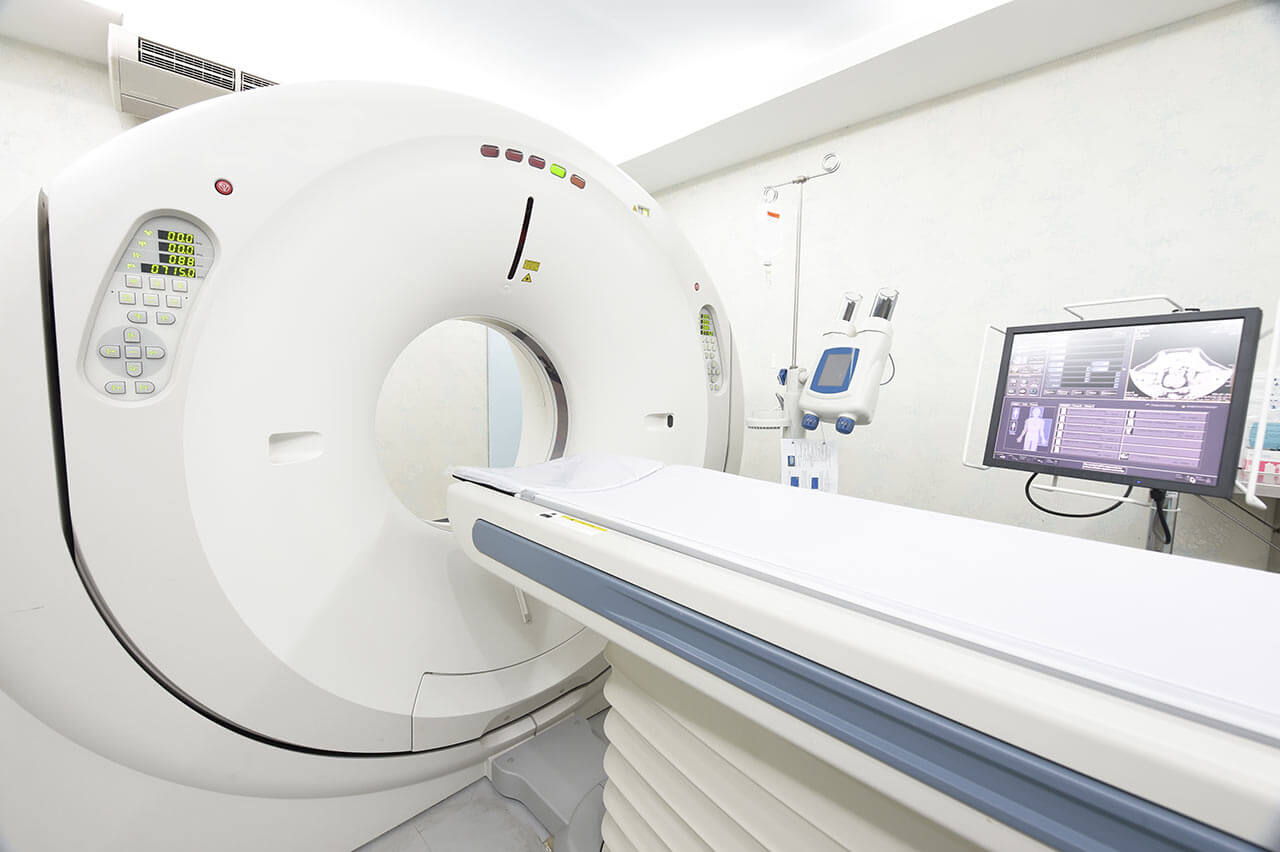
The program includes:
- Initial presentation in the clinic
- clinical history taking
- review of medical records
- physical examination
- laboratory tests:
- complete blood count
- general urine analysis
- biochemical analysis of blood
- TSH-basal, fT3, fT4
- tumor markers
- indicators of inflammation
- indicators blood coagulation
- ophthalmological examination
- planning of proton therapy
- surgical clip marker
- a full course of proton therapy
- full hospital accommodation
- nursing services
- explanation of future recommendations
How program is carried out
Proton therapy is the outpatient procedure, you do not need to stay in the hospital all the time.
During the first visit, the physician will conduct a clinical examination, go through the available medical records and CT scans. If necessary, the physician will prescribe you additional examinations in order to clarify the diagnosis and determine the localization of the tumor more accurately.
Preparation for proton therapy begins with manufacturing the special device – the individual immobilizer that will fix the position of your body during a proton therapy session. Immobility is essential for high irradiation accuracy.
After the control computed tomography, during which you will stay in the immobilizer, the healthcare professionals will develop an individual treatment scheme. The treatment scheme determines the number of proton therapy sessions, the radiation dose, the angle of the rays and the depth of their penetration. In accordance with these, technical devices are manufactured that determine the depth and form of irradiation. These are the collimator (determines the shape of the proton beam) and the bolus (determines the depth of the proton beam penetration).
After that, a trial irradiation session is carried out using the individual immobilizer, collimator and bolus. Doctors evaluate the radiation dose received by the tumor and its compliance with the treatment scheme.
Proton therapy. The procedures are carried out once a day, 5 days a week. Usually Saturday and Sunday are your free days when you do not need to visit the hospital.
Before each procedure, specialists check the position of your body using X-ray in two projections. If necessary, the irradiation is synchronized with the respiratory movements. After that, the tumor is exposed to the proton beams for 1-3 minutes. The total duration of the session with all the checking procedures is 15-30 minutes.
The procedure is painless and is performed in open-type devices (this is important for overweight people or people with claustrophobia). Proton therapy does not require bed rest or other restrictions of physical activity.
Monitoring the treatment effectiveness. After completing the treatment, you will be advised to come in for the long-term follow-up. You will visit your doctor regularly for a clinical examination and, if necessary, a CT scan.
Required documents
- Medical records
- MRI/CT scan (not older than 3 months)
Service
You may also book:
 BookingHealth Price from:
BookingHealth Price from:
About the department
69 Booking Health patients have already received treatment in the Department of Adult and Pediatric Proton Therapy at the Proton Therapy Center Prague.
95% of patients recommend this hospital and department.
You can read reviews about the quality of the Booking Health service here.
The Department of Adult and Pediatric Proton Therapy at the the Proton Therapy Center Prague offers the most advanced and accurate form of radiotherapy currently available to treat various cancers. The department has 5 specialized treatment rooms equipped with state-of-the-art technology, including IBA Proton Technology, Pencil Beam Scanning, Patlog™ from a Swedish firm called ONCOlog etc. The department also has a specially designed room for eye treatment. A feature of the department is that it deals with the treatment of young patients. Each specialist working here sets a goal not only to provide excellent treatment quality, but also to please patients with high standards of patient care. The department is headed by Asst. Prof. Dr. med. Jiří Kubeš.
The department is highly-specialized in proton therapy, which is an invisible and highly controlled beam that works by using pencil point precision to target a tumor. When it releases radiation, the radiation beam slows down, which allows the protons to interact with electrons allowing a release of high-energy. This high-energy is then released into its designated location (the tumour). As the beam is controlled by a physician, it only targets the shape and depth of a tumor to allow healthy tissue to remain undamaged.
Proton therapy is made possible through the cyclotron technology. A cyclotron is a type of particle accelerator in which charged particles accelerate outwards from the centre along a spiral path. The particles are held to a spiral trajectory by a static magnetic field and accelerated by a rapidly varying (radio frequency) electric field. The cyclotrons can be used in particle therapy to treat cancer. The ion beams from cyclotrons can be used, as in protons therapy, to penetrate the body and kill tumours by radiation damage, while minimizing damage to healthy tissue along their path.
Proton therapy is considered a better way to treat cancer because it has fewer side effects, but the technology is expensive. The majority of proton centres throughout the world currently use "scattered beam" nozzles to deliver the protons to cancerous tumors. Although the scattered beams are extremely effective, the department is among the leaders who use even more effective and very precise "pencil-beam" technique.
Proton therapy is based on the use of positively charged elementary particles of hydrogen atom nuclei – namely protons that have a weight much higher than that of electrons. Protons are accelerated in a cyclotron to a speed equal to approximately half the speed of light. This also determines their energy, which reaches up to 230 MeV (mega-electron volts) and enables them to damage tumors up to a depth of approximately 30 cm. The protons are then targeted with a strong magnetic field into a very narrow beam (a "pencil beam") and transferred with a high degree of accuracy via a 3D image to the malignant tumor. Energy is released during deceleration in the tumor tissue with subsequent ionisation and damage to the DNA of the affected cell. If the damage is sufficient, the cell stops dividing (and growing) or dies immediately.
Such physical properties of the proton beam as low entry dose, maximal dose of energy at the required depth and a zero exit dose enable extremely precise modulation of dose distribution inside the patient’s body and represent the main advantage of proton radiotherapy. Due to this feature, it is possible to increase the dose directed at the tumor to a level above that which could be achieved using common, conventional X-ray radiotherapy techniques, and at the same time the doctor can reduce the dose to surrounding tissues that are sensitive to the harmful effects of radiation.
An integral part of each treatment scheme is an individual planning of the proton therapy procedure. To this end, the department has several high-tech systems that allow the doctors to clearly imagine the true size, shape and position of tumors. By combining a radiation oncology information system (MOSAIQ) and the other various high-end 3D and 4D imaging systems, the department's specialists are able to obtain a comprehensive understanding of a tumour and the treatment options available.
Special attention should also be given to the modern patient positioning systems within every treatment room. These systems serve to support and position patients with submillimeter accuracy to allow the proton beam to be delivered with great precision to any point in the patient from any angle.
All treatments and examinations are usually performed on an outpatient basis, but it is worth noting that children usually require hospitalization (hospital stay is provided by the department's partner – University Hospital in Motol).
In some cases, patients may need a combination of proton therapy and chemotherapy. To this end, the department offers specially designed rooms for chemotherapy treatment and competent medical staff.
The patients with metal or ceramic parts in the body may be a contraindication for proton therapy. A pacemaker is a contraindication for proton therapy as well.
The department specializes in proton therapy for the following types of cancer:
Brain cancer |
|
Breast cancer (proton therapy can be conducted only after surgery) | |
Gastrointestinal cancer |
|
Head, neck and orofacial tumors |
|
Non-small-cell lung carcinoma |
|
Lymphomas |
|
Pediatric cancers |
|
Prostate cancer | |
Other oncological diseases in adults and children |
Curriculum vitae
With a great deal of clinical experience from several institutions as a radiation oncologist, Dr. med. Jiří Kubeš is a specialist in prostate cancer, as well as head and neck tumours. He joined the Proton Therapy Center Prague in 2012 and became the Medical Director in January 2014. Dr Kubeš is an Assistant Professor at the Charles University and the Institute for Postgraduate Education in Medicine.
Photo of the doctor: (c) Proton Therapy UK
About hospital
The Proton Therapy Center Prague is one of the most advanced medical facilities in Europe, which offers the very latest and accurate form of radiotherapy currently available. The center opened its doors to cancer sufferers in 2012 and has since treated patients from over 48 different countries, including the United States, Spain, Israel, Kenya and Australia. Internationally recognized as one of the most advanced cancer treatment centres of its kind in the world, it combines ultramodern technology with clinical competence and compassionate individualized patient care.
With 5 dedicated treatment rooms, the center has the capacity to treat about 2,500 patients each year. 3 of these treatment rooms have movable devices that are capable of 360-degree rotation around patients. This means tumours can be treated anywhere in the body, from any angle, up to a depth of 32cm. One of the rooms offers "fixed beam" treatments, while the final room is specially designed for eye treatments.
Equipped with state-of-the-art technology to precisely plan and conduct proton therapy procedures, the medical facility aims to provide all our patients with the highest level of treatment effectiveness, as well as the highest standard of comfort and patient care.
In addition to proton therapy cancer treatments, the center is fully equipped with a wide-range of stand-alone diagnostic services (MRI, CT, PET-CT), and has the ability to provide onsite chemotherapy in combination with proton therapy. The patients suffering from prostate cancer can undergo all the necessary urologic diagnostic tests within the center. The experienced and highly competent urologists carry out fiducial marker insertion procedures prior to proton therapy.
All treatment procedures comply with the strictest international requirements, while all patients are provided with the highest standards of service and care.
The medical facility employs only highly professional experts who have long clinical experience in a particular medical field. In addition, the center maintains close cooperation with the leading Czech universities and other educational institutions supporting science and research with the aim to contribute to the development of radiation oncology and other oncological specializations.
Photo: (c) depositphotos
Accommodation in hospital
Hotel
You may stay at the hotel of your choice during the outpatient program. Our managers will help you choose the best option.




